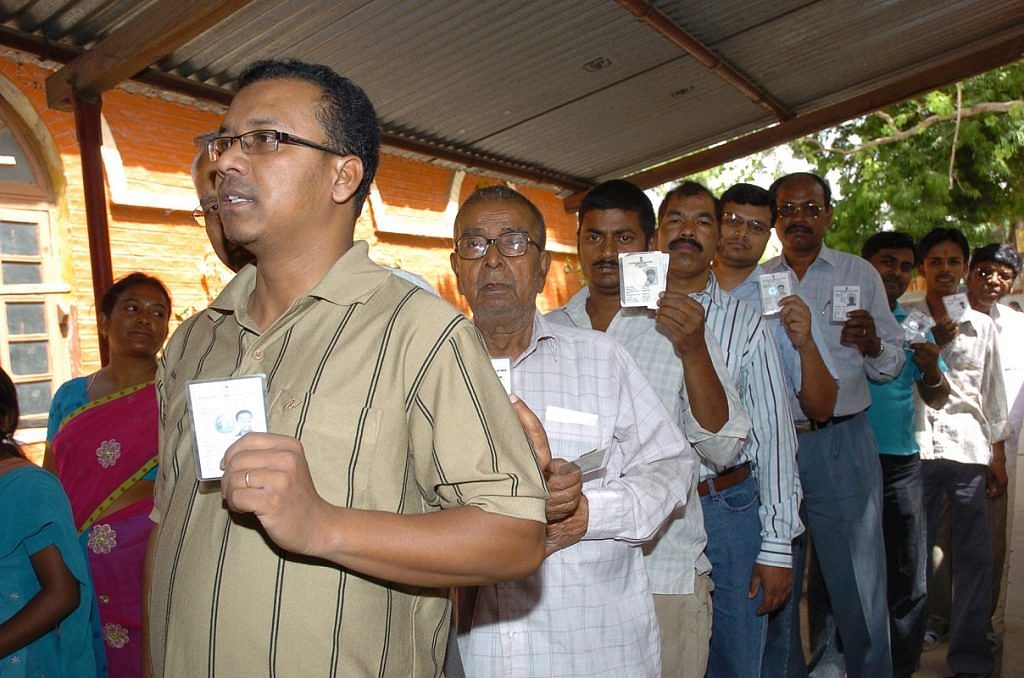Report is based on a two-day seminar held in January; shows how simultaneous polls can reduce the massive expenditure on elections, and the burden on govt staff.
New Delhi: Prime Minister Narendra Modi’s pet proposal of holding simultaneous elections to the Lok Sabha and state assemblies has received the backing of experts and opinion makers.
The BJP has submitted a 36-page report citing their support to Modi on 23 March. The report quotes a NITI Aayog paper which says the government think tank “recommends a two-phased election: the Lok Sabha and roughly half the state assemblies together in 2019, and the rest of the states in 2021”.
The report is based on the outcome of a two-day brainstorming session held in January this year and organised by Rambhau Mhalgi Prabodhini, a Thane-based Right-wing research and training institute, in partnership with Indian Council of Social Science Research.
There were five major issues that were discussed during the two-day seminar, which included hazards of multiplicity of elections, concept and implementation related issues in simultaneous elections, no-confidence and dissolution of house, idea of aligning local body elections with general elections and experiences of simultaneous polls abroad.
Parliamentary committee report
The document submitted to the PM also cited a report by a parliamentary standing committee headed by Dr E.M. Sudarsana Natchiappan, a Congress MP from Tamil Nadu, which observed that simulations polls would reduce massive election expenditure, the policy paralysis that results from the imposition of the model code of conduct during election time including impact on delivery of essential services and burden on crucial manpower that is deployed during election.
The parliamentary panel report had stressed the need of holding simultaneous elections for Lok Sabha and state assemblies. It said that out of 16 general elections to Lok Sabha, the lower house of Parliament was prematurely dissolved seven times due to exigencies of politics and with no party getting clear majority.
NITI Aayog paper
A NITI Aayog discussion paper stated that India has witnessed a phase of simultaneous elections roughly from 1951 to 1967 which coincided with three terms of general elections to Lok Sabha as the electoral process started from ground zero.
“Hence, simultaneity was implicit in this period. However, the circumstantial simultaneity was hampered from the 1967 elections. From that point on, not only the cycle of elections for both Lok Sabha and state legislative assemblies digressed, but also the exigencies of Indian politics at federal and central level along with electoral politics,” it observed.
Views of experts and political leaders
The report contains views of leaders from across parties as well as experts. It said how Shakti Sinha, director of Nehru Memorial and Museum and Library, had explained with examples about the major hazards of multiplicity of elections in India and burden on state machineries that are deployed during election time.
He also said that a platform should be created to materialise the concept of ‘one nation, one election’.
According to the report, Dr Rajiv Kumar, chairman of NITI Aayog, based the success of re-election of a candidate on his ‘good work’ and hoped that ‘one nation, one election would, be a reality in future.
The report clearly said that opposition parties such as the Congress, Trinamool Congress, NCP, and CPI objected to the idea of holding simultaneous elections.
This is what political leaders had to say about the idea:
“I don’t see this as a BJP programme. This is a national election reform.”
— K.C Tyagi, Janata Dal (United)
“In the United States, if a government loses a majority, people change, not the government. If we do all this by December, all states can go to polls by 2019.”
— Baijayant ‘Jay’ Panda, Lok Sabha MP
“There must be constructive dialogue between elected representatives and voters on sensitive topics like ‘one nation one election’ to free the country from the policy paralysis that occurs due to frequent elections.”
— Manohar Lal Khattar, Haryana CM
“Simultaneous elections are the major democratic reform that the nation is waiting for decades and hence a nationwide discourse about the same is for consensus building is the need of the hour,”
— Vinay Sahasrabuddhe, Rajya Sabha MP and president Indian Council for Cultural Relations
The Thane-based institute will organise similar programmes in Raipur, Jaipur and Indore in the next few months besides launching a pan-India awareness campaign on the subject.
